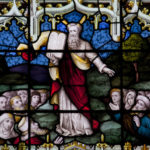We run our website the way we wished the whole internet worked: we provide high quality original content with no ads. We are funded solely by your direct support. Please consider supporting this project.

Cruciform Aikido Pt 3: The Judge Who Lets Them Have It
We ended our last post noting that in the cross God ingeniously turned evil back on itself and triumphed over it. But what does all this teach us about the nature of divine judgment? Two things.
First, as the one who bore our sin, Jesus experienced the judgment we deserved when the Father withdrew himself and allowed wicked humans and wicked angelic agents to put him to death. The essence of sin is pushing God away, and since God is the source of life, the natural consequence of sin is death (Rom. 6:23; Ja. 1:13-15). Hence, the cross teaches us that the Divine Judge judges by “letting them have it”—that is, what they want. They want to be free from God, so God—with a grieving heart (Lk 19:41)—allows them to be free from him. He thus withdraws his protective presence thereby allowing them to experience the death-consequences of their choices. This is what the Father did with the innocent one who bore the sin of the world, and since this is the quintessential revelation of divine judgment, we should conclude that this is what he reluctantly does with all who persist in pushing him away.
Second, as we noted above, by delivering the one who bore the sin of the world over to Satan and the fallen powers, God defeated these forces of evil. The love that was manifested in this supremely loving sacrifice defeated the powers behind all hatred. The light and truth about God’s loving character that was manifested in this quintessential revelatory act ended the lie about God’s character that first infected human minds in the Garden (Gen. 3:1-5), and thus defeated the powers of darkness and deception. The manner in which Jesus’ death reconciled us to God, removing the sin that gave Satan rights over us (Col. 2:14-16), left the entire realm of darkness powerless against us.
In this light, it’s clear that the crucifixion—which Satan and the fallen powers helped to orchestrate—backfired on this entire realm of darkness, bringing about their demise. So it is that Paul declares that if the fallen cosmic rulers of this world had “understood the wisdom of God, they would not have crucified the Lord of glory” (1 Cor. 2:8). And since the cross is the quintessential revelation of the true nature of God’s judgment, it becomes apparent that God judges evil by allowing it to run its course and to ultimately self-implode.
Image by Duane Schoon. Used in accordance with Creative Commons. Sourced via Flickr.
Cruciform Aikido Series
Category: General
Tags: Cruciform Theology, Judgement
Related Reading

Did God Give Violent Laws? A Response to Paul Copan (#13)
In his critique of Crucifixion of the Warrior God (CWG) at the Evangelical Theological Society annual meeting in November, Paul Copan takes issue with my contention that the violent dimension of OT laws reflects God accommodating the fallen and culturally conditioned perspectives of his people at this time. In my view, God was stooping to…

How Classical Theology Gets It Wrong
Classical theology has conceived of God as altogether necessary, simple, timeless, unchanging and unknowable. This view of God requires us to conclude that biblical images of God do not reflect the way God truly is insofar as they portray God moving in sequence with humans from the past into the future, for this obviously conflicts…

Can Bible Imperfections IMPROVE the Reliability of the Bible? (podcast)
Greg talks about his new book: Inspired Imperfection: How the Bible’s Problems Enhance Its Divine Authority. Episode 537 http://traffic.libsyn.com/askgregboyd/Episode_0537.mp3

When God Endorsed Polygamy
We often find God acting as if he supports things we know, by other means, that he does not. For example, though his ideal was monogamy, it’s clear in the biblical narrative that, once God decided to permit men to acquire multiple wives and concubines, he was not above bearing the sin of his people…

Does God Have a Dark Side?
In the previous post, I argued that we ought to allow the incarnate and crucified Christ to redefine God for us rather than assume we know God ahead of time and then attempt to superimpose this understanding of God onto Christ. When we do this, I’ve argued, we arrive at the understanding that the essence…

Does Jesus’ Abandonment on the Cross Destroy the Trinity?
In my previous blog I argued that Jesus’ experience of God-forsakenness on the cross was genuine and that, as a matter of fact, there was a genuine abandonment of Jesus by the Father on the cross. In fact, I am convinced that a good deal of our theology hangs in the balance on our affirming…
